Tomato Cobbler with Canned Tomatoes
This post may contain affiliate links that won’t change your price but will share some commission.
Tomato Cobbler is a savory cobbler that brings comfort to the table with every bite. The rich tomato, onion, and garlic filling combined with a soft, buttery biscuit topping is perfect for cozy nights.
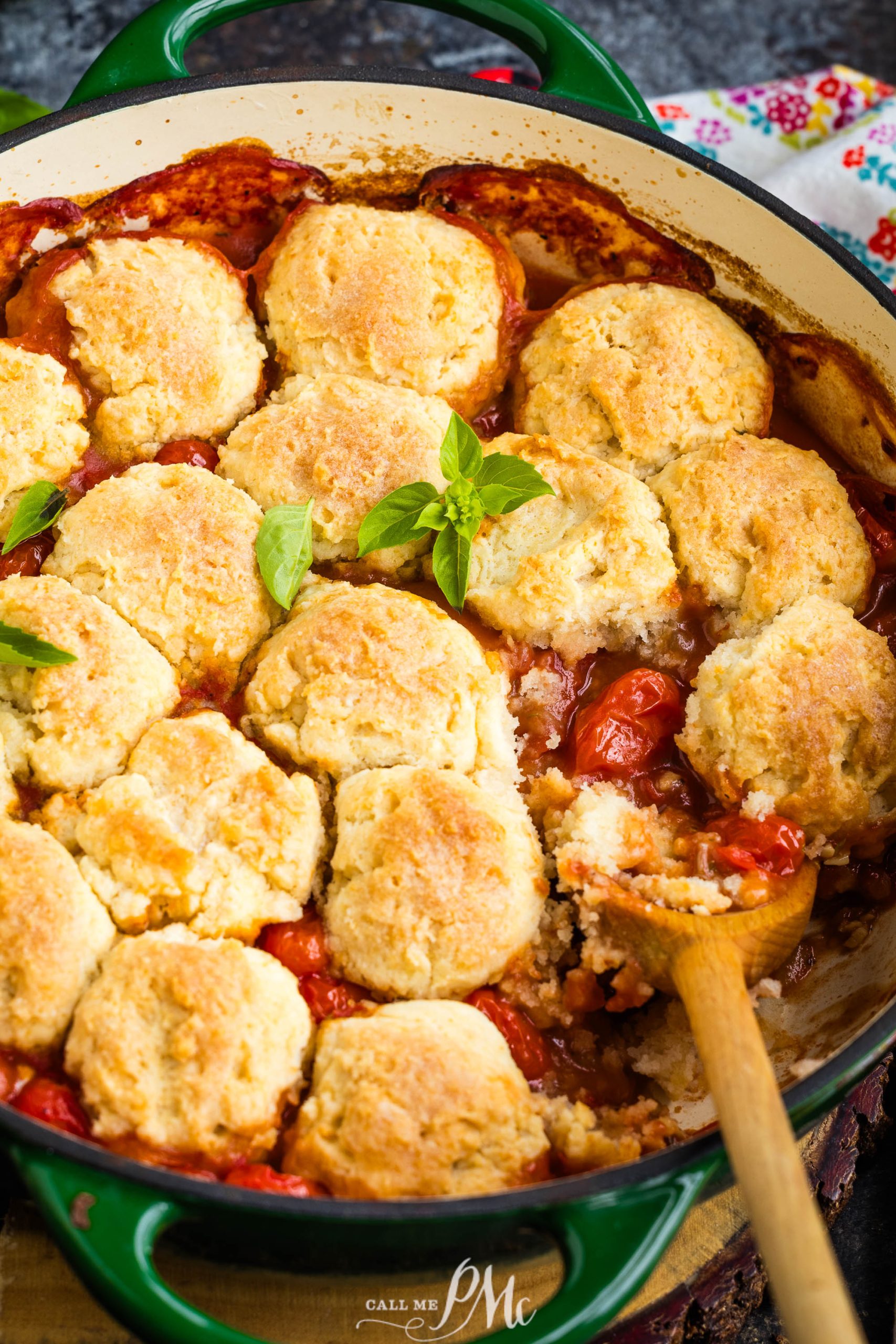
Tomato Cobbler with Canned Tomatoes
I love how the tomatoes develop a deep, sweet flavor as they bake. I used canned tomatoes which makes this recipe quick and easy. This allows you to whip up tomato cobbler even when fresh tomatoes aren’t available. Adding a handful of grape tomatoes (that are available all year in most areas) adds a bit of freshness, balancing out the canned tomatoes nicely.
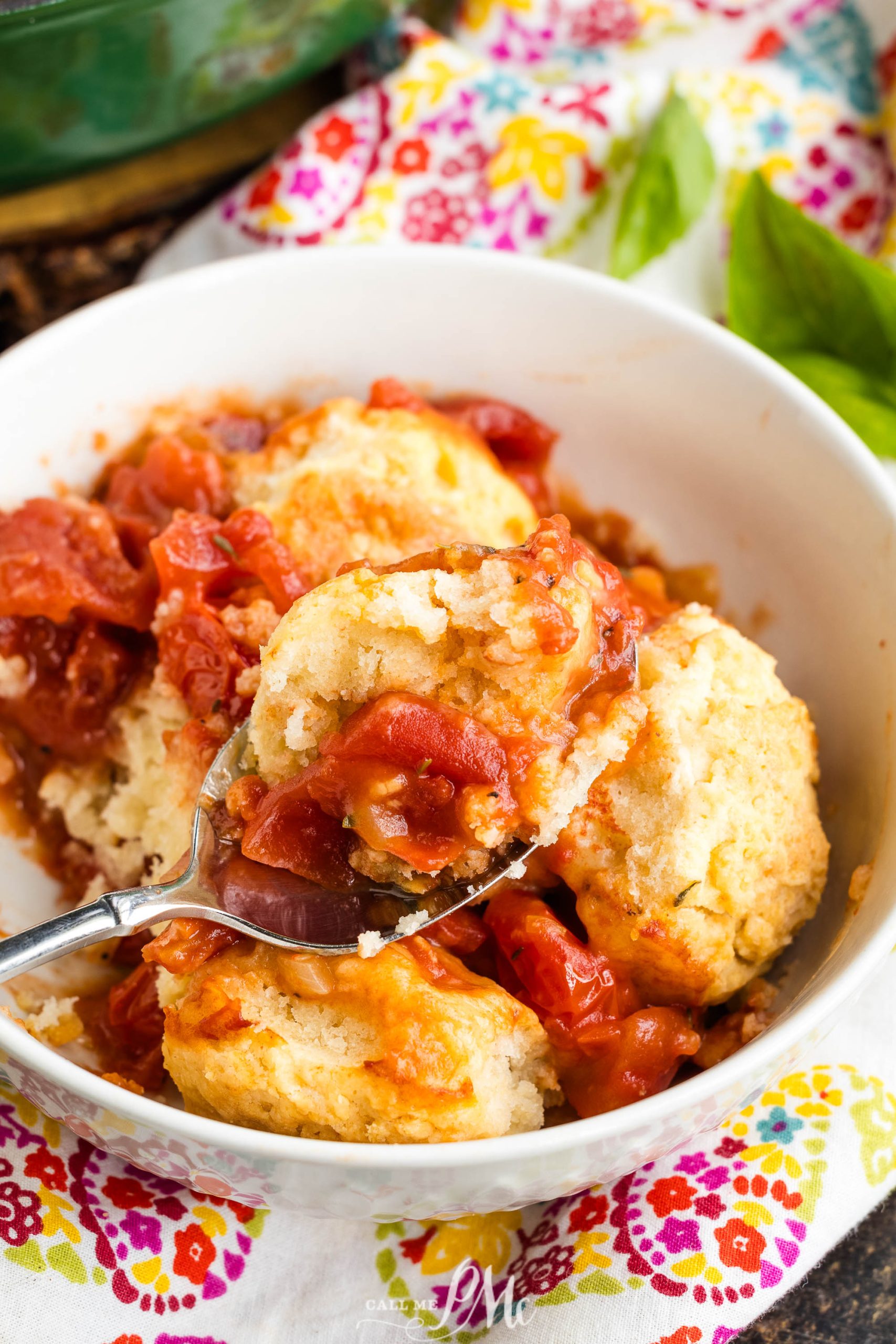
PMc says:
Tomato Cobbler reminds me of my family’s long-time favorite tomato dumplings. I have such fond memories of tomato dumplings. This recipe is also quick, easy, and budget-friendly. I’m looking forward to your comments after you make it!
Adding a squeeze of lemon before baking enhances the tomatoes’ natural flavor. And, if you enjoy a bit of heat, sprinkle extra red pepper flakes or hot sauce over the filling for a mild kick.
Here’s the Tomato Dumpling recipe.
Ingredients
The full recipe with ingredient amounts and instructions is at the bottom of this post. You can save a tree and the recipe to your personal and private recipe box here on Call Me PMc. This way, you’ll never misplace it.
Here’s the ingredients you’ll need for tomato cobbler with canned tomatoes.
Tomatoes
- olive oil
- Vidalia onion, or white or yellow onion
- garlic clove, minced
- diced canned tomatoes
- grape tomatoes
- fresh lemon juice
- brown sugar
- all-purpose flour or cornstarch
- salt
- black pepper
- dried thyme
- red pepper flakes
Biscuit Topping
- self-rising flour or
all-purpose flour +2 tsp baking powder + ½ teaspoon salt - butter, I used salted.
- heavy whipping cream
- Cheddar cheese, optional
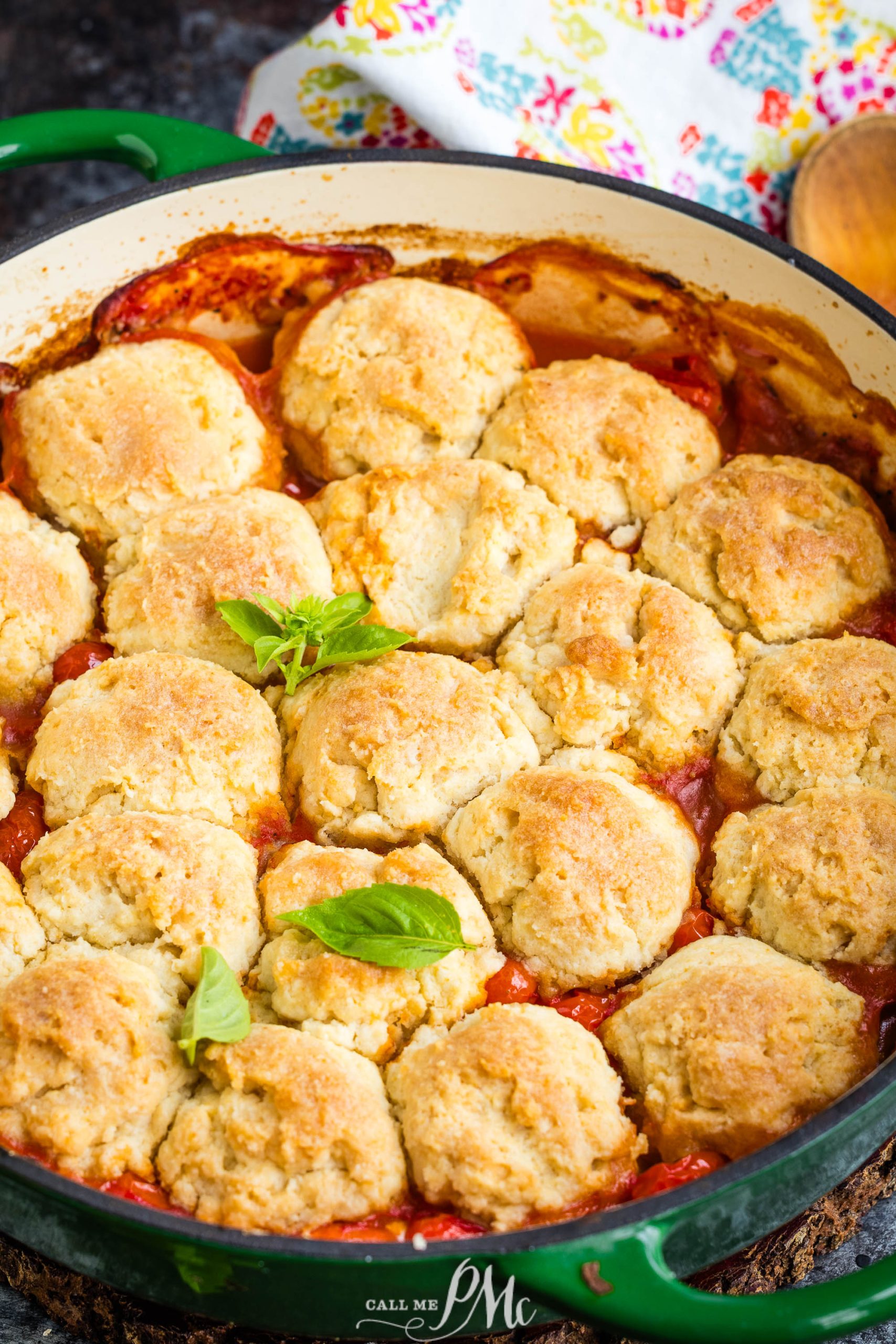
Tomato Cobbler Equipment Needed
- 3 quart pan, stove top and oven-safe, OR
- 12-inch cast iron skillet with 3-inch sides
- measuring cups and spoons
- Wood Stirring Spoon
- chef’s knife
- Cutting Board
- Bowls
- pastry blender or fork
- 2 Tablespoon spring-release scoop
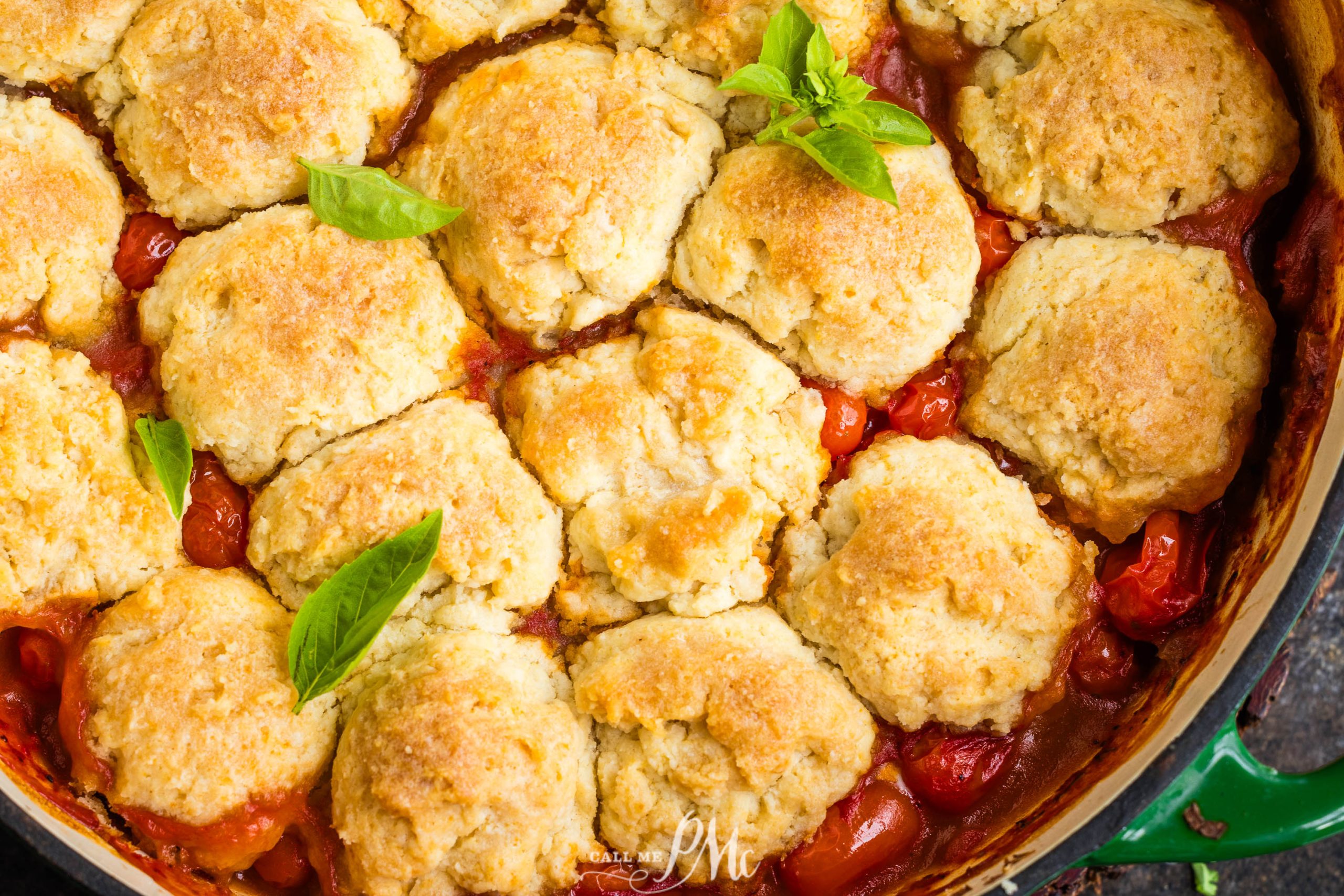
Cooking Tips
- Thickening the Filling: Adding a small amount of flour or cornstarch helps to thicken the tomato mixture, preventing your tomato cobbler from being too watery.
- Preparing the Biscuit Topping: Use cold
butter when mixing the biscuit dough. This will help create a flaky, tender texture as thebutter melts during baking. - Add Cheese for Extra Flavor: If you’re a cheese lover, mix some shredded Cheddar into the biscuit topping. It adds a wonderful richness and pairs well with the savory tomato filling.
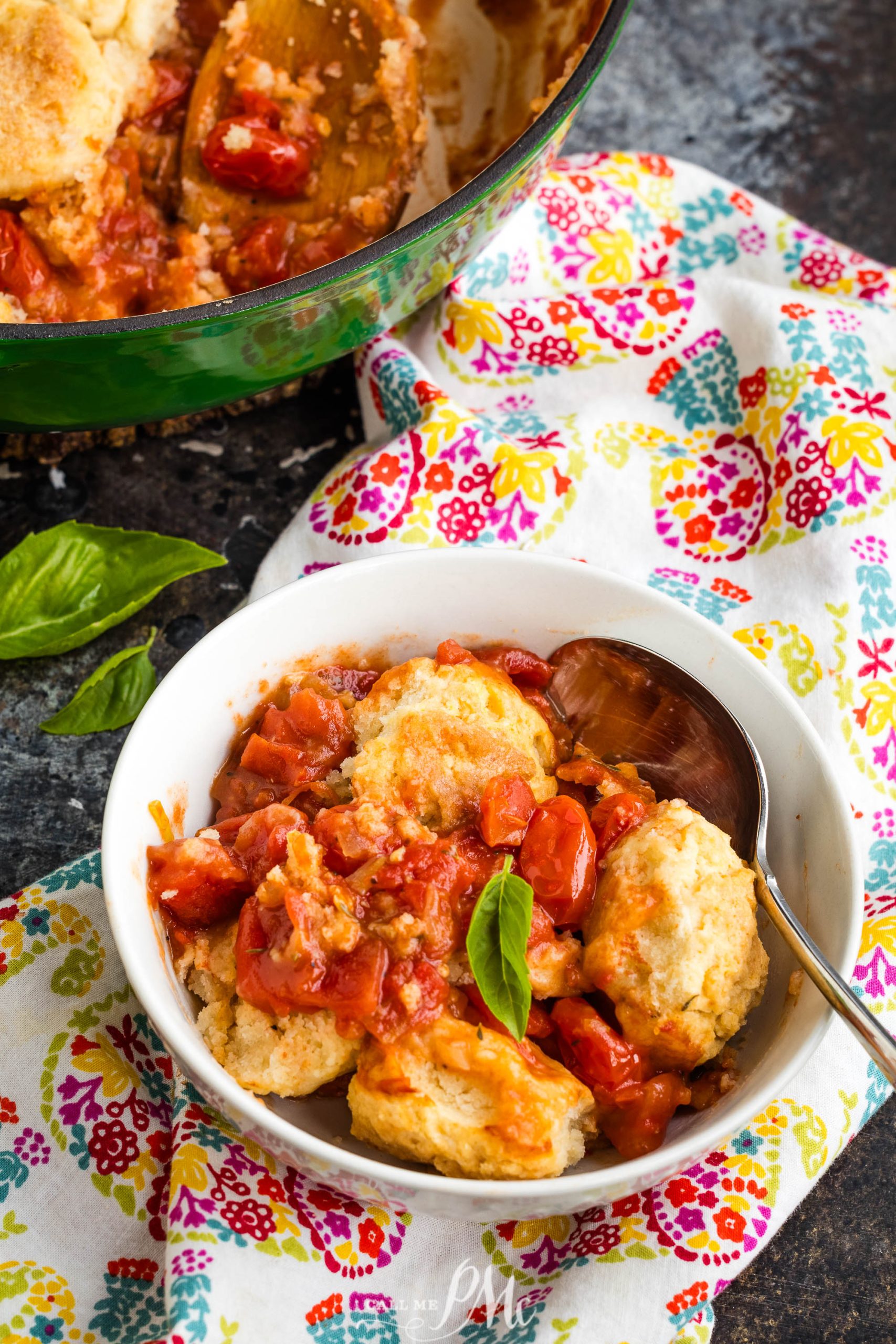
Tomato Cobbler Frequently Asked Questions
Can I make this ahead of time?
Yes, you can prepare the tomato filling in advance and store it in the fridge for up to two days. When you’re ready to bake, add the biscuit topping and bake as usual.
What other herbs can I use?
If thyme isn’t available, you can try dried basil or rosemary. Both add a delicious aroma and flavor to the cobbler.
Can I use fresh tomatoes instead of canned?
Absolutely. For tomato cobbler you can substitute the canned tomatoes with about 3-4 fresh tomatoes, diced. The tomato cobbler might need a bit longer to bake since fresh tomatoes have more moisture.
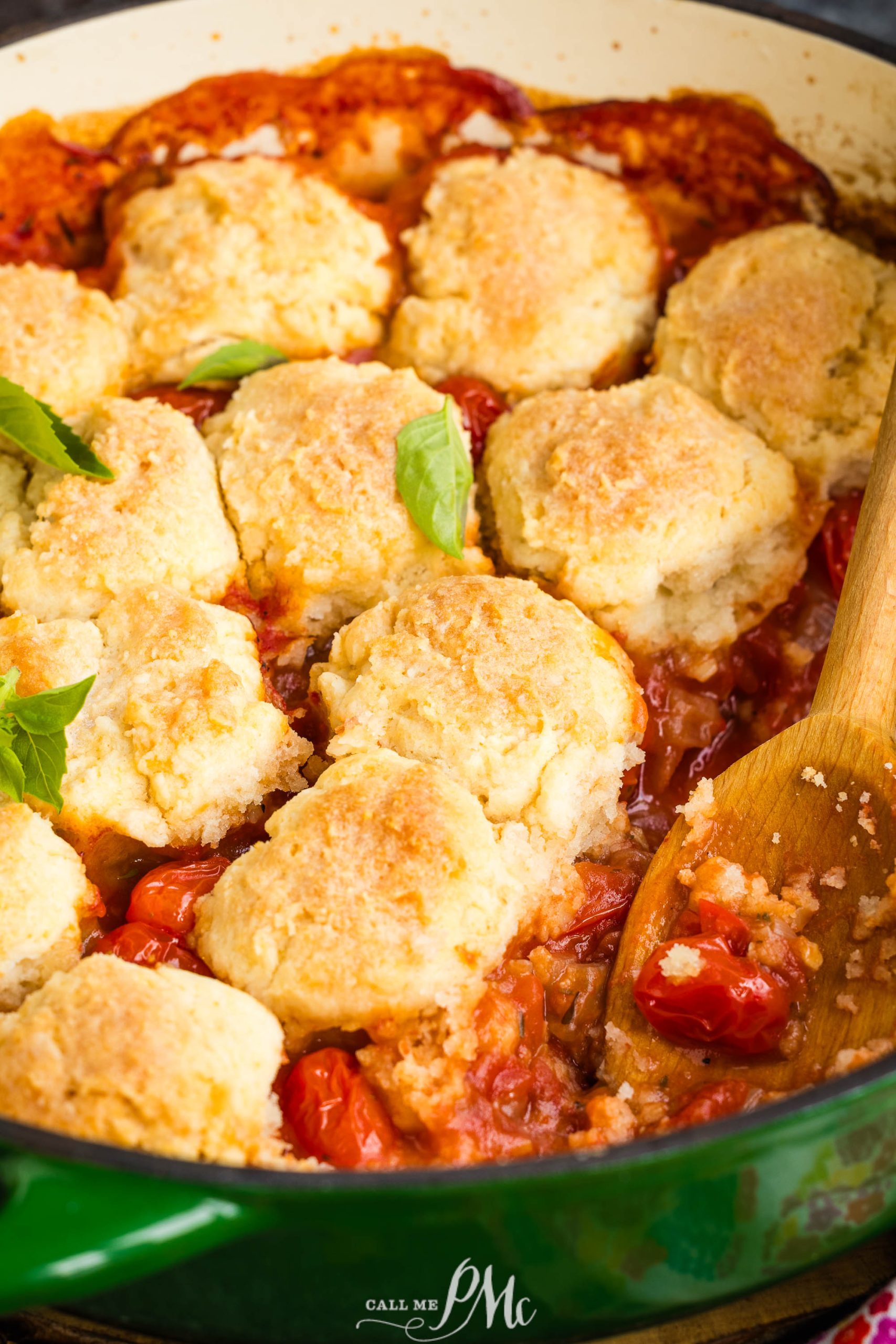
Tomato Cobbler Conclusion
Tomato Cobbler with Canned Tomatoes is a satisfying meal. It’s easy to put together, flavorful, and great for any meal. Whether you enjoy it as a main or a side, this cobbler is sure to be a family favorite.
Related recipes
In addition to tomato cobbler, enjoy my latest recipes
- Street Corn Jalapeno Coleslaw
- What to Cook in July: Fresh, Easy Recipes for Summer
- Natural Attractions of Route 66
- Secrets for the Best Burgers
- Summer Lunches to Beat the Heat

Tomato Cobbler with Canned Tomatoes
Items in blue & underlined below can be clicked for more detail or to purchase.
Equipment
- 3 quart pan stove top and oven-safe, OR
- 12-inch cast iron skillet with 3-inch sides
- pastry blender or fork
Ingredients
Tomatoes
- 1 tablespoon olive oil
- ½ cup Vidalia onion or white or yellow onion
- 2 medium garlic clove minced
- 2 15-ounce cans tomatoes diced, undrained
- 1 pint grape tomatoes
- 1 teaspoon fresh lemon juice
- 1 teaspoon brown sugar
- 1 tablespoon all-purpose flour or cornstarch
- 1 teaspoon salt
- 1 teaspoon black pepper
- 1 teaspoon dried thyme
- ¼ teaspoon red pepper flakes
Biscuit Topping
- 2 cups self-rising flour or all-purpose flour +2 tsp baking powder + ½ teaspoon salt
- 8 talespoons butter I used salted.
- 1 and ½ cups heavy whipping cream
- 1 cup Cheddar cheese optional
Instructions
Tomatoes
- Pre-heat the oven to 375℉.
- Add olive oil to your skillet and heat to medium. Add onions and cook until they become soft and translucent, about 15 minutes. Add the garlic and cook 2 minutes.1 tablespoon olive oil , ½ cup Vidalia onion, 2 medium garlic clove
- Add the canned and fresh tomatoes, fresh lemon juice, brown sugar, all-purpose flour, salt, pepper, red pepper flakes, and thyme. Stir. Bring to a boil and reduce heat to simmer. Simmer for 10 minutes while you're making the biscuit topping.2 15-ounce cans tomatoes, 1 pint grape tomatoes, 1 teaspoon fresh lemon juice, 1 teaspoon brown sugar, 1 tablespoon all-purpose flour, 1 teaspoon salt, 1 teaspoon black pepper, 1 teaspoon dried thyme, ¼ teaspoon red pepper flakes
Biscuit topping
- Add flour (or flour, baking powder, & salt) and butter to a bowl. Cut with a pastry blender or fork until mixture is crumbly with pea-sized lumps. (Stir in the cheese with a fork if adding cheese.)2 cups self-rising flour, 8 talespoons butter, 1 cup Cheddar cheese
- Add 1 and ½ cups heavy cream. Stir with a fork. The biscuit dough will be a little sticky.1 and ½ cups heavy whipping cream
- Take a large spoon or 2-tablespoon spring-release scoop and drop the biscuit dough over the top of the tomato filling. (I had 20-22 small biscuits. I forgot to count them.)
- Bake for 35 to 45 minutes. (Watch them close after 30 minutes.)
- Let cool slightly and serve warm.
Nutrition
Nutritional information given is an automatic calculation and can vary based on the exact products you use and changes you make to the recipe. If these numbers are important to you, I recommend calculating them yourself.
